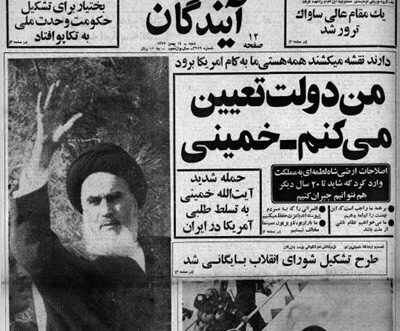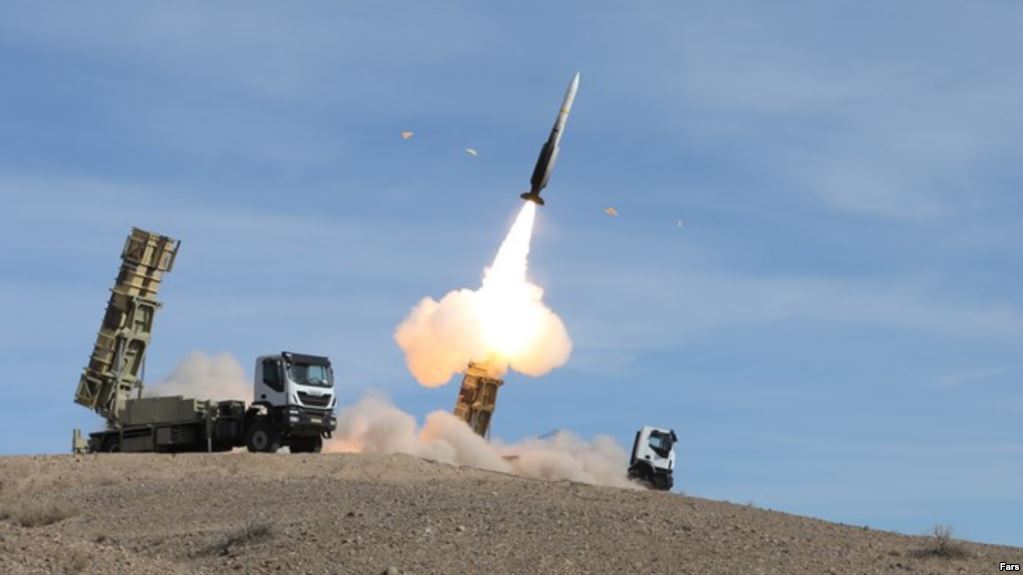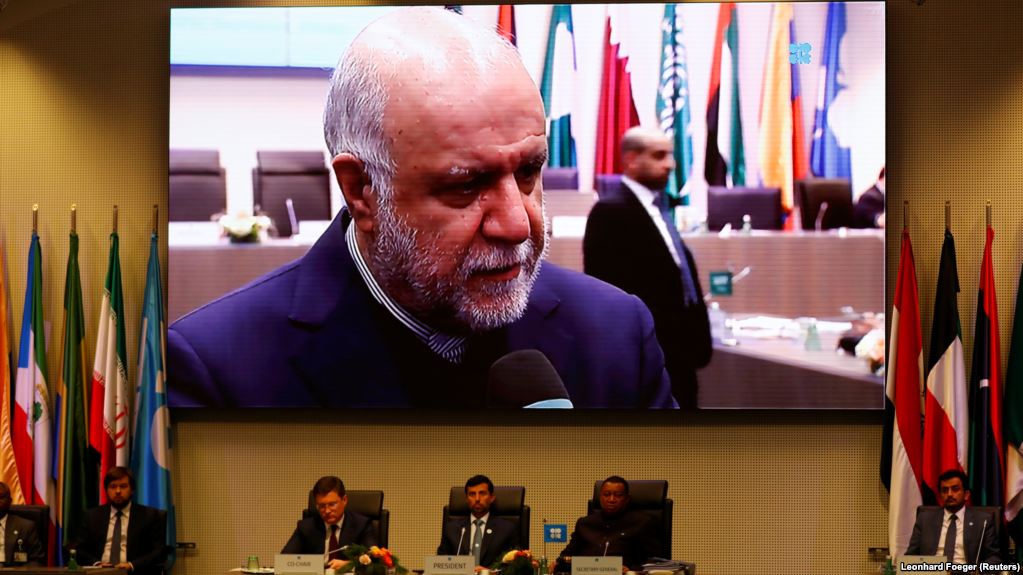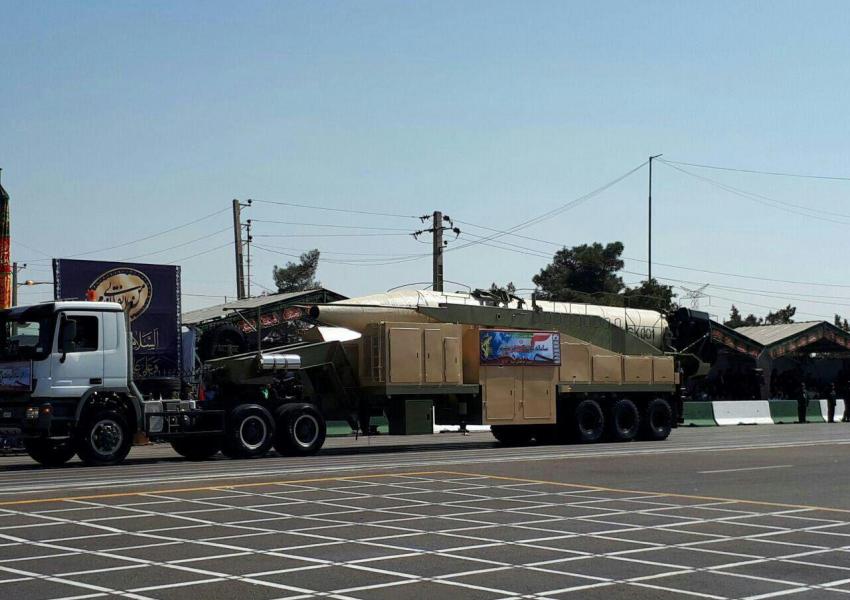
The European Union Changes its Position
The editorial of Arman Emrooz deals with the recent European Union (EU) statement, which was issued after launching an alternative financing mechanism for doing business with Iran and it expressed serious concerns over the Islamic Republic’s missile testing and its activities.
The EU statement commends the Islamic Republic’s commitment to the full implementation of its obligations with regard to the nuclear deal. Yet it expresses serious concerns over Tehran’s missile activities, asking the Islamic Republic to avoid these actions particularly that of launching missiles in defiance of the UNSCR 2231. Given the relatively good relations between Iran and the EU during the past three years, it is hard to predict with certainty which direction the relations are heading for.
The editorial continues by mentioning that there is now a change in the EU’s behavior and position with regard to the nuclear deal. The EU’s position was that the nuclear deal is apart from other issues related to the Islamic Republic. When the Islamic Republic is acting in accordance with its obligations to the IAEA and NPT, the statement shouldn’t have dealt with issues that are not related to the nuclear deal and its details.
However, the issued statement contradicts the EU’s earlier stand. The statement can be worrying and might end in Europe and the United States getting closer to each other, thus undermining Europe’s decisive position with regard to the nuclear deal. The longstanding political relations between the United States and the EU must not be forgotten.
The editorial suggests that what Iran can do is to enhance and expand the level of dialogue between different groups of people in Iran and Europe. Therefore, the issue of the nuclear deal must be brought to the domain of public diplomacy, and NGOs, academics, elites, and journalists must get involved in this domain to prepare the ground for dialogue.
Arman Emrooz – February 6
Unemployed University Graduates in Iran
The editorial of Mardomsalari newspaper focuses on the shocking statistics of the rate of unemployed among university graduates in Iran.
The statistics show that 75% of the unemployed are university graduates. The Iranian youth spend the best years of their lives in universities, imposing many costs on their families and society to get an academic degree. Nevertheless, eventually, academic degrees are worthless, making it impossible for these people to be absorbed by the labour market.
The editorial goes on to say that unlike in developed countries, having an academic degree in Iran doesn’t increase the chance of employment; on the contrary, these degrees decrease the probability of employment for the graduates. This hasn’t happened overnight. The officials have been warned for years that increasing the number of students without paying attention to the labour market – particularly given the fact that the graduates do not have the proper training for the market – will add fuel to the unemployment crisis.
This warning was not taken seriously. Due to the expansion of universities with no acceptable standards, the number of graduates with little knowledge and no skills has increased. On the other hand, a considerable increase in the statistics of applicants for postgraduate studies indicates that graduate students apply for higher degrees because they haven`t found proper jobs. However, this means more expenses, wastage of time, and lost opportunities.
The editorial asserts that they are now talking about an increase in the number of Ph.D. graduates. Annually 30,000 Ph.D. graduates are added to the unemployed in Iran. It is about time officials should think of a solution to put an end to this situation. Only those who are qualified must be accepted to postgraduate and Ph.D. studies; the capacity in universities must be in accordance with the labour market, and students must have adequate training for the market.
Mardomsalari– February 5
Revisiting the Government’s Relationship with its People on the Revolutions 40th Anniversary
The 40th anniversary of the Iranian Revolution has coincided with vicissitudes in both the domestic and international spheres. The editorial of Arman Emrooz goes over the relationship between the Government and the people particularly focusing on their rights.
The Republicans’ gaining power in the United States and a new cold war between the east and west indicate that there are new conditions for Iran’s presence on the international level. On the other hand, economic and managerial crises in Iran, along with extensive corruption, has had an inevitable impact on the Iranian people.
The editorial continues to mention that even though the Iranian people have faced war and sanctions before, what adds to the complexity of sanctions and tensions now is the increasing frustration due to extensive corruption and inequality among different groups of people, elites, and officials. Any political system needs the public’s support to overcome the crises it is facing.
Likewise, the Government’s duty is to provide a proper life for the people in which they can personally flourish and enjoy welfare. If people are used as soldiers to support the establishment, the Government, must not forget that it must provide livelihood, jobs and social welfare for the people. It seems that this mutual relationship has become one-sided, with the Government’s demands outweighing its ability to fulfill its duties.
The editorial goes on to say that the Iranian Revolution is now facing serious challenges. It must announce its own policies for Iranian society while fighting corruption and inequality. If the revolution is to continue under the current sensitive conditions, it requires the reconstruction of mutual relations between the Government and the people; with the Government meeting public demands.
The editorial concludes by mentioning that the most significant right of the people on the government is to enjoy livelihood, freedom, and security – to which the Government must pay attention.
Arman Emrooz – February 4
Can Trade with Europe be Turned into an Opportunity?
Britain, Germany, and France – and not the European Union – announced their financial mechanism to cooperate with Iran, even though there has been a delay due to their own differences and Trump’s pressure. The editorial of Setareh Sobh daily focuses on how Iran can change this into an opportunity.
This is a step forward and can save Iran’s economy from the suffocation it is experiencing under the current US sanctions, holds the editorialist. Under the present conditions when Iran is facing Trump’s excessive pressures, the Europeans’ move must be deemed as a step forward and an opportunity for Iran to form strategic cooperation with Europe. First, Iran can use this opportunity to stand up to Trump and sidestep the sanctions. Second, the oil revenues must be kept in the euro. Third, the country’s banking and financial problems can be solved.
Four features of this mechanism — which was previously called the Special Purpose Vehicle and is now named as INSTEX — are: 1) it works like a ‘clearing house’ in double accounting where debts are cleared with credits. 2) The clearing of accounts takes place in two Iranian and European chambers. 3) It is a ‘barter arrangement’ that takes place outside the financial system dominated by America. 4) The details of the programs and activities will be formed as it moves forward.
The editorial adds that this fluid structure will help both sides to regulate their future activities based on needs and requirements, as well as global standards. This will allow Iran to improve the level of the country’s obsolete banking system to international standards and to provide for the country’s extensive trade needs.
The editorial concludes by saying that this European measure can help in bringing stability back to the Iranian market which has experienced severe challenges due to US economic sanctions.
Setareh Sobh – February 3

Velayat-e Faqih has Failed

On the 40th anniversary of the establishment of the Islamic Republic in Iran, a group of prominent Iranian Muslim thinkers have issued a statement, emphasizing that the idea of a state based on Velayat-e Faqih [Islamic jurisprudence] has totally failed. They have called for the separation of religion from the state in Iran.
The signatories of the statement urge that even though the current government in Iran was formed after a popular, anti-despotic revolution, it has reproduced despotism in a religious form. They have also called for equality in the religious, gender, language, and ethnic spheres, as well as the recognition of the rights of all Iranian citizens.
The thinkers who have signed the statement hold that the 40-year experience of the Islamic Republic shows that deploying the principles of the past centuries has resulted in destruction and disaster while making society imbued with poverty, discrimination, and corruption.
The statement reads: the Islamic Republic, with its shallow religious jurisprudence and its adventurism in the international domain, has inflicted a heavy burden on Iran’s economy, rights, politics, women and ethnic and religious minorities under Velayat-e Faqih.
According to these thinkers, the religious state in Iran has manifested itself to the people – particularly the youth – in the form of floggings, amputations, forced hijab, and the state policing morality. Moreover, it interferes in the private sphere in the name of enjoining good and prohibiting evil, bans music and concerts, allocates significant amounts of money to religious propaganda organizations, creates a mass following for religious figures, and it indulges in despotism, torture, and mass executions as witnessed in the 1980s. In addition, it has been known for practicing discrimination against women, religion and other minorities, and structural corruption.
Zeitoon
Will INSTEX Solve the Islamic Republic’s Economic Problems?

Britain, Germany, and France eventually announced launching a special financial mechanism for Iran called INSTEX (Instrument In Support of Trade Exchange), a system that is meant to help non-dollar trade with Iran and avoid US sanctions.
Even though the details of INSTEX have not been announced yet, it seems that as a first step, it is just for food, drugs and medical equipment that are not directly under the US sanctions. According to documents published by the European Troika, this financial channel works within the legal framework of the United Nations and the European Union, anti-money laundering laws (AML), and combatting the financing of terrorism (CFT). It is also urged that observing FATF recommendations be stipulated as one of the working regulations for INSTEX.
Iran’s Chief Justice Sadegh Larijani reacted to the preconditions set by the Europeans for implementing INSTEX and called them “humiliating”. In addition, Mohsen Rezaee, secretary to the Expediency Council, posted a tweet in this regard, calling setting precondition for INSTEX “extortion”. He wrote, “INSTEX is a channel for bartering and goods. After so much delay, tying AML and CFT to INSTEX is extortion. The Europeans must fulfill their obligations in the nuclear deal and should not set new conditions for us.”
Following the announcement of INSTEX, the European Union issued a statement, expressing serious concern over Tehran’s ballistic missile activities, asking the Islamic Republic to stop these activities particularly launching ballistic missiles.
The EU statement addresses a wide range of issues related to Iran including its ballistic missile program, Tehran’s role in the region, launching INSTEX, Iran’s commitment to its obligation within JCPOA framework, and Tehran’s hostile activities in some European capitals. The statement emphasized Iran`s efforts to increase the range and precision of its missiles, adding that such activities foster distrust and instability in the region.
Gooya news
Radio Farda
The Red Meat Crisis Continues on the 40th Anniversary of the Islamic Revolution

The Tehran prosecutor announced two meat importers who violated the law have been arrested. Abbas Jafari Dolatabadi added he has issued an order to seal off a store that sold meat at 150 thousand tomans per kilogram.
The red meat market has been hit by a crisis due to its skyrocketing prices on one hand and a lack of policymaking to decrease its price on the other. Red meat is sold at more than 100 thousand tomans a kilogram in Tehran these days. Although its price is lower in the stores where governmental food support packages and imported meat are presented, people have to stand in queues from 5 a.m. to buy it, as its amount is limited.
This is happening despite the unprecedented increase in the import of meat, which reached 188 percent in the first 10 months of this year, compared to last year, according to the head of the Iranian Customs Organization.
An official in the Ministry of Agriculture stated the reason for the rising prices of meat is smuggling livestock. He added that US sanctions affecting foreign currency in the country have played a major role in this regard as well. Moreover, the head of the central union of Iran’s animal farmers has said smuggling meat to Arab countries, especially Iraq, has worsened the crisis. He added nearly one million livestock is smuggled into Arab countries on a yearly basis; that is, 200 thousand tons of red meat.
However, the statistics announced by officials is much less than what people living near the borders and smugglers say. It should also be mentioned that no serious obstacle exists in the path of livestock smugglers. According to the people living near borders, the livestock, which is smuggled out of Iran usually, returns to the country through import and sold at a much higher price.
Mizan online news agency
RFI news
The Oil Minister: US Sanctions are Tougher than the War with Iraq

The Oil Minister Bijan Namdar Zanganeh admitted that the US sanctions against Iran are tougher than the 8-year war with Iraq.
Speaking at a press conference in Tehran, Namdar Zanganeh complained that no country buys oil from Iran. He added the Europeans, except for Turkey, have not purchased oil from Iran. Although Greece and Italy have been granted exemptions to buy oil from Iran, they refuse to do so, said Zanaganeh, adding that those countries do not even announce the reason for it.
The entire export of Iran’s crude oil shows more than a 50% decrease after the US pulling out of the nuclear deal, dropping to 1 million bpd.
Zanganeh then pointed to Iraq’s lack of interest in cooperation with Iran and not accepting partnership in two small oil fields in Khorramshahr and Naft Shahr. “We used to swap 11 thousand barrels of oil from Kirkuk,” said Zanganeh, “but they even stopped that after the sanctions.” Zanganeh also said Iraq owes $2 billion to Iran for importing gas and electricity but it refuses to pay Iran due to the sanctions.
Iran has five big joint oil fields with Iraq – with Iraq producing twice as much oil as Iran from these fields.
The United States exempted Iraq from the sanctions to import Iran’s gas, but the exemption is valid until spring. Iraq says it needs Iran’s gas for producing electricity. Iran also exports electricity to Iraq directly.
BBC Persian
Radio Farda
The IRGC Threatens Europe with a Strategic Leap in its Missile Program

The IRGC second-in-command, Brigadier-General Hossein Salami, called the Islamic Republic’s missile capacity unstoppable and uncontrollable, adding that if the Europeans are after “conspiring to disarm Iran’s missile program, we have to turn to taking a strategic leap”. In an interview with the Iran state-run TV, Salami mentioned that the Islamic Republic has “enemies” that are after undermining it and want to “disarm the Iranian nation through mental, political, economic pressure.”
Salami emphasized that nobody should even make any recommendations or demands with regard to Iran’s missilee programs as it might make the Islamic Republic change its “preemptive strategy”. The fixed range of Iranian missile, stressed Salami, is not because of technical issues, but due to the Islamic Republic’s strategy.
The IRGC second-in-command added that the Islamic Republic has no limit for increasing the range, precision, and the desired destructive power of the missiles. In another part of his interview, he went on to threaten Israel, saying if it starts another war in the region, it will be annihilated.
Currently, the range of Iran’s mid-range missiles is 2000km, which can reach Israel and the European Union.
One of the reasons the United States withdrew from the nuclear deal was the Islamic Republic’s missile activities. Recently the European Union has issued a statement expressing concerns over Tehran’s missile program considering it as a serious threat to stability in the region.
Despite the international pressure on Iran to stop developing its missile program, the Islamicc Republic’s defense ministry recently announced the delivery of long-range Hoveizeh cruise missile to IRGC’s Aerospace, while showing footages of this missile being fired. Hoveizeh is said to have a range of 1350km and can be used against land targets.
Deutsche Welle
Iran International
